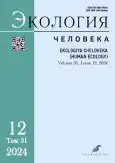Environmental culture and greening of everyday life among youth in the Republic of Tatarstan
- Authors: Saveleva Z.V.1, Khokhlov A.A.1
-
Affiliations:
- Kazan (Volga Region) Federal University
- Issue: Vol 31, No 12 (2024)
- Pages: 906-920
- Section: ORIGINAL STUDY ARTICLES
- URL: https://journal-vniispk.ru/1728-0869/article/view/314564
- DOI: https://doi.org/10.17816/humeco643423
- EDN: https://elibrary.ru/wzwrpm
- ID: 314564
Cite item
Full Text
Abstract
BACKGROUND: The need for a detailed examination of young people’s environmental awareness and behavior—as well as identification of the characteristics of these components of environmental culture—is supported by previous empirical research. Youth in the Republic of Tatarstan demonstrate a high level of environmental engagement: 74% report interest in environmental issues, 93% believe they can personally contribute to environmental protection, and 72% report participating in environmental initiatives.
AIM: The study aimed to examine the nature and content of environmental culture components among young people (awareness and behavior), as well as their experience of environmental integration into everyday life in modern society (using the Republic of Tatarstan as example).
METHODS: To collect social data, both quantitative (a mass online survey of young people aged 16–35 residing in the Republic of Tatarstan, n=1349, 2023) and qualitative (focus group discussions with “student” and “working” youth (n=6, 2023–2024) methods were employed. The selection of respondents for the mass online survey was carried out with consideration of gender, age, and type of settlement. Focus group participants were selected using purposive sampling.
RESULTS: The study made it possible to gather young people’s opinions regarding their interest in environmental issues, their level of participation in environmental initiatives, and their adoption of environmentally conscious practices. Discussion of young people’s experiences of environmental integration into their daily lives made it possible to identify existing institutional and non-institutional barriers to pursuing an eco-friendly lifestyle.
CONCLUSION: The study of environmental culture components among youth in the Republic of Tatarstan showed that environmental situation, along with family values, rank highly among life priorities. The level of interest in environmental issues and involvement in ecological initiatives is sufficient to enable environmentally justified actions toward the environment, carried out with an awareness of their consequences. The variables are influenced by social and demographic characteristics (age, gender, type of residence), the type of the respondent’s activity, and prior exposure to the subject of Ecology.
Full Text
##article.viewOnOriginalSite##About the authors
Zhanna V. Saveleva
Kazan (Volga Region) Federal University
Author for correspondence.
Email: gedier@mail.ru
ORCID iD: 0000-0003-1465-0664
SPIN-code: 6808-3803
Scopus Author ID: 57202516186
ResearcherId: S-4460-2016
Dr. Sci. (Sociology), Associate Professor
Russian Federation, KazanAlexey A. Khokhlov
Kazan (Volga Region) Federal University
Email: X_alesha@mail.ru
ORCID iD: 0009-0006-6484-7026
SPIN-code: 2254-9201
Russian Federation, Kazan
References
- Hickman C, Marks E, Pihkala P, et al. Climate anxiety in children and young people and their beliefs about government responses to climate change: a global survey. The Lancet Planetary Health. 2021;5(12):e863–e873. doi: 10.1016/s2542-5196(21)00278-3EDN: NNGEWS
- Denault AS, Bouchard M, Proulx J, et al. Predictors of pro-environmental behaviors in adolescence: a scoping review. Sustainability. 2024;16(13):5383. doi: 10.3390/su16135383 EDN: IAXBOK
- Nazneen L, Asghar M. Parental modeling, a determinant of pro-environmental attitude and behavior in youth. Peshawar Journal of Psychology and Behavioral Sciences (PJPBS). 2018;4(1):33–43. doi: 10.32879/picp.2018.4.1.33
- Tam KP. Dispositional empathy with nature. Journal of Environmental Psychology. 2013;35:92–104. doi: 10.1016/j.jenvp.2013.05.004
- Casaló LV, Escario JJ. Intergenerational association of environmental concern: Evidence of parents› and children›s concern. Journal of Environmental Psychology. 2016;48:65–74. doi: 10.1016/j.jenvp.2016.09.001
- Lovochkina A, Otych D, Spivak L. Formation of students’ environmental awareness through social media. Conhecimento & Diversidade. 2023;15(36):556–569. doi: 10.18316/rcd.v15i36.10973 EDN: VVEGCN
- Sanchez M, Lafuente R. Defining and measuring environmental consciousness. Revista Internacional de Sociologia. 2010;68(3):732–755. doi: 10.3989/ris.2008.11.03
- Stern PC. New Environmental theories: toward a coherent theory of environmentally significant behavior. Journal of Social Issues. 2000;56(3):407–424. doi: 10.1111/0022-4537.00175
- Shutaleva A, Martyushev N, Nikonova Z, et al. Environmental behavior of youth and sustainable development. Sustainability. 2021;14(1):250. doi: 10.3390/su14010250EDN: RUCIXU
- Golbrajh VB. Environmental activism: new forms of political participation. Power and elites. 2016;3:98–120. (In Russ.) doi: 10.31119/pe.2016.3.4
- Ermolaeva P. Environmental practices among the USA and Russian students: cross cultural analys. Bulgarian Journal of Science and Education Policy (BJSEP). 2011;5(2):364–384.
- Zakharova VA. Ecologization of social behavior and formation of ecological culture of modern Russian youth in the context of civil society development. Humanities of the South of Russia. 2020;9(1):178–187. doi: 10.19181/2227-8656.2020.1.13 EDN: DPDOTG
- Zaharova VA. Environmental behavior of modern youth: all-Russian and regional trends: monograph. Мoscow: RUSAJNS, 2023. (In Russ.) ISBN: 978-5-466-03260-4
- Ermolaeva PO, Ermolaeva YV. Critical analysis of foreign theories of environmental behavior. Monitoring of Public Opinion: Economic and Social Changes. 2019;(4):323–346. doi: 10.14515/monitoring.2019.4.16 EDN: VUDGPJ
Supplementary files









